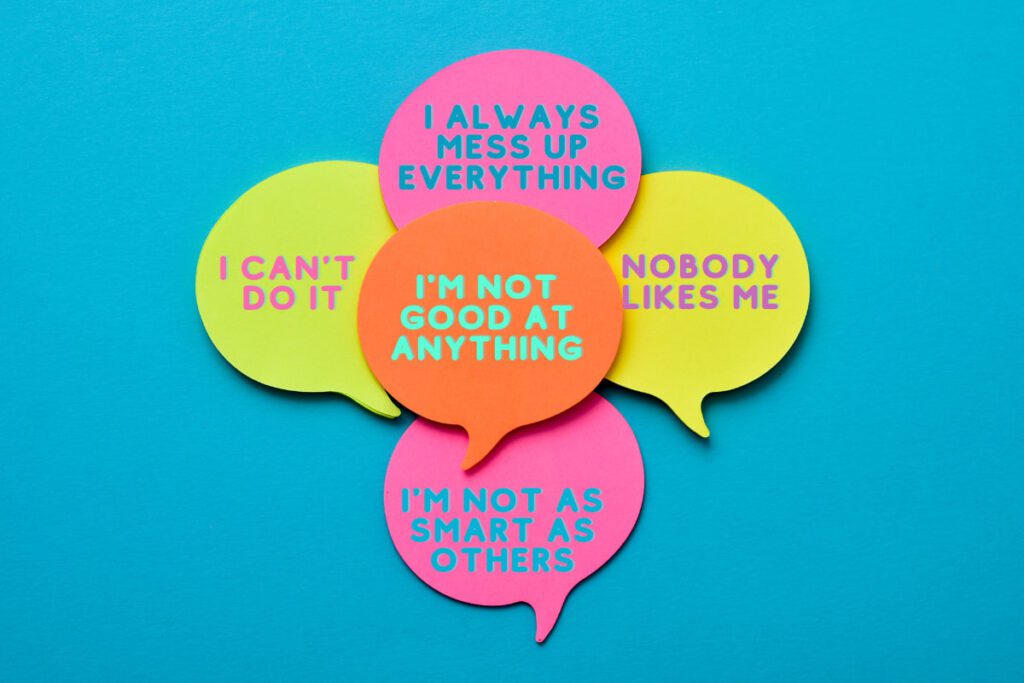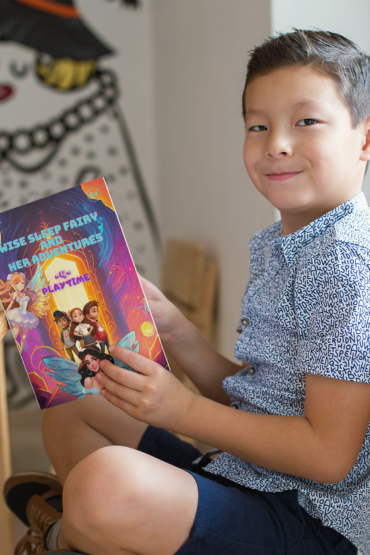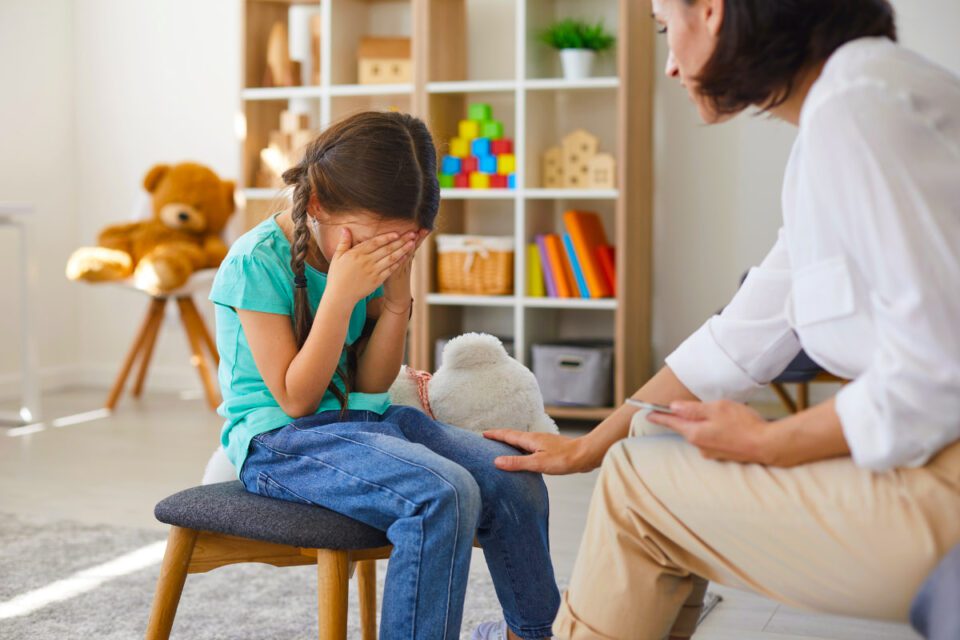In the vibrant world of childhood, where imagination knows no bounds, the impact of words can be profound. As parents, understanding the role of self-talk in children’s emotional well-being is crucial. In this article, we will delve into the causes of negative self-talk in children, its link to anxiety, and explore the transformative power of words to nurture a positive self-image to tackle anxiety in children.
Table of Contents
What is negative self-talk?
Negative self-talk refers to the inner dialogue or thoughts that are critical, pessimistic, or self-deprecating. It involves the habit of consistently using negative language when thinking about oneself. For children, negative self-talk can impact their self-esteem, confidence, and overall well-being.
What Causes Negative Self-Talk in Children?
Negative self-talk in children often stems from external influences, such as societal expectations, peer pressure, or family dynamics. Unhealthy comparisons and unrealistic standards can trigger a child’s inner critic, leading to negative thoughts about their abilities and worth.
ChIldren are the lIvIng messages we send to a tIme we wIll not see. Let’s fIll theIr journey wIth joy and happIness
Here are some examples of negative self-talk that might resonate with little children:
- I’m not good at anything.
- This thought implies a general lack of ability or worth, which can hinder a child’s self-confidence.
- Nobody likes me.
- This thought suggests feelings of isolation and can contribute to social anxiety in children.
- I always mess up everything.
- This type of negative self-talk can lead to a fear of making mistakes and hinder a child’s willingness to try new things.
- I’m not as smart as others.
- This thought may stem from comparisons with peers and can negatively impact a child’s self-perception and academic confidence.
- I can’t do it; it’s too hard.
- This negative self-talk can create a fixed mindset, where a child believes they cannot overcome challenges or learn new skills.
- I’m not as pretty/strong/talented as others.
- This type of comparison-based self-talk can contribute to body image issues or a sense of inadequacy.
- I always make people angry.
- This thought can lead to social anxiety and fear of negative consequences in social interactions.

Can Self-Talk Cause Anxiety in Children?
Absolutely. The dialogue that children have with themselves shapes their perception of the world. When this self-talk becomes predominantly negative, it can contribute to anxiety in children. Understanding the correlation between self-talk and anxiety is crucial for fostering a supportive environment for our little ones. Moreover, the fear of failure, social rejection, or not meeting expectations can amplify the internal dialogue, creating a cycle of self-doubt. Research suggests that increased levels of anxiety were associated with higher rates of negative self-talk. And, negative self-talk plays a role in the generation or maintenance of anxiety in children. (Lodge J, Harte DK, Tripp G. Children’s self-talk under conditions of mild anxiety. J Anxiety Disord. 1998)
Words have the power to heal, to InspIre, and to transform. Choose them wIsely, for they create the world you lIve In
What Does Anxiety Look Like in a Child?
Identifying anxiety in children involves recognizing behavioral changes. These may manifest as restlessness, irritability, difficulty concentrating, or physical symptoms like headaches or stomachaches. Paying attention to these signs is vital for early intervention.
Which Form of Self-Talk is Often Predictive of Anxiety in Children?
Research suggests that catastrophizing, a form of negative self-talk where children imagine the worst possible outcomes, is often predictive of anxiety. Addressing this pattern early is crucial for preventing the escalation of anxiety.
How to Fix Negative Self-Talk in Children?
- Open Communication: Encourage your child to express their thoughts and feelings without judgment. Be a compassionate listener.
- Positive Reinforcement: Celebrate their achievements, no matter how small. Positive feedback fosters a sense of accomplishment.
- Teach Coping Strategies: Equip your child with age-appropriate coping mechanisms, such as deep breathing exercises or visualization.

Why is Positive Self-Talk Important?
Positive self-talk lays the foundation for a healthy self-esteem, resilience, and emotional well-being. It empowers children to face challenges with confidence, promoting a positive outlook on life.
The Importance of Transformative Power of Words and Affirmations
Words have the power to shape a child’s reality. Introducing positive affirmations can counteract negative self-talk, fostering a resilient and confident mindset. Affirmations like “I am capable,” “I am healthy”, “I am loved,” and “I am beautiful” instill a positive self-image.
Tips for Responding to Negative Self-Talk
- Reframe Negative Thoughts: Guide your child in reframing negative thoughts into positive ones.
- Encourage Self-Compassion: Teach your child to treat themselves with kindness, especially when facing challenges.
- Model Positive Self-Talk: Children often emulate their parents. Demonstrating positive self-talk sets a powerful example.
- Redefining ‘Mistakes’ as ‘Opportunities’: Mistakes are valuable learning opportunities. Encouraging children to view mistakes as a natural part of the learning journey builds their capacity to bounce back from challenges. When children feel comfortable acknowledging and learning from their mistakes, they are less likely to experience anxiety associated with perfectionism or the fear of failure.
“Wise Sleep Fairy and Her Adventures: Playtime – Supports Children Using the Power of Words
In this enchanting children’s book, Nana, Yumyum, and Dodo begin a exciting game guided by the Game Fairy, Joy. There is only one rule in this game: to believe in what you say sincerely. Through this captivating story, children discover the incredible power of words and how they shape their world. The narrative emphasizes that the words they believe in become their reality, reinforcing the importance of positive self-talk.
Conclusion
Words are lIke seeds; when planted In the fertIle soIl of the mInd, they can grow Into a garden of possIbIlItIes
As parents, recognizing the impact of words on our children’s well-being is a powerful tool in nurturing their emotional health. By understanding the causes of negative self-talk, addressing anxiety, and harnessing the transformative power of words, we can empower our children to navigate life with confidence and resilience. Together, let’s create a world where the language we use fosters happiness, positivity, and a bright future for our little ones.

